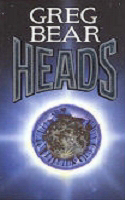

Darwin's Radio was the first full length science fiction novel I have ever read and I made a fine choice. Bear's style for teasing out possible "what if" scenarios is not so much science fiction verbatim, but a plausible if unlikely fact. Human DNA contains a lot of unused material which is hypothesized as being put there by viruses. What if one of the so called viruses no longer remained dormant but starting killing of Humankind and replacing us? Geneticists are unable to explain why and how this so called SHEVA virus now erupts as "Herod's 'Flu". Mothers to be are mysteriously miscarrying globally, the world is in a panic, religious fundamentalists are in uproar at this supposed natural selection and evolution of Homo-Sapiens. Can anything be done? Will anything be done? Should anything be done? This novel had the feel of a taut science fiction thriller mixing archaeology, politics, religion, mass hysteria with genocide, evolution theory, terror and finally acceptance. At times this novel seems to have all the ingredients of a classic perfectly in balance but Greg Bear's pace at which he cooks up all these juicy nuggets of the Human experience is too slow. Otherwise it's near perfect.


Living on the moon isn't easy. Some two centuries from now the appeal of life on the moon has lost if flavour. The remaining families which control all aspects of everyday life are insular and slow to change their ways. Our main protagonist is Mickey, a young man who one day is informed by his headstrong sister Rhosalind that she has acquired at some expense four hundred and ten frozen heads. The reason for the purchased these "corpiscles" is to vindicate Rhosalind theories that she can with the aid of William's ground breaking work with Quantum Logic computers scan the intact memories the deceased. The work is viewed with both derision and suspicion by other families on the moon. William (Rhosalind's husband) is a genius working with a hired and select worker crew in a sealed part of the colony known as the Ice Pit. He has been working for some time on achieving a holy grail of physics. That monumental task is to achieve absolute zero degrees under laboratory conditions. It all seems innocent enough but does the wide eyed innocence of Mickey with both his respect for Williams' work and his love for his determined sisters beliefs blind him to the unctuous nature of moon side politics. This was an easy to read novella punctuated with idiosyncratic characters too en meshed in their own work and system of beliefs to see the bigger picture. Quickly Mickey casts off the last vestiges of immaturity and irresponsibly to become a man who learns fast what it is like to be burdened with moral, social and family dilemmas. I enjoyed reading this novel as it was a fast paced page turner with a simmering plot, Machiavellian politics and faith being put to the test. For such a short novella I was wondering with having read almost two thirds of the story if this was to condense into a rushed ending in which a lot of people die or some sort of surreal finish which leaves many questions unanswered, It turns out to be latter and the novella is better for it. It was a story line which culminated in a finish of pique and tenderness that many years after the events inside the Ice Pit, Mickey's nostalgic reminiscences are all too human and understandable. A short but worthy read.


I've read two previous offerings form Greg Bear and although his ideas are very good he has never completely won me over. Written in 1985 when bio technology was in its infancy, Greg Bear's Blood Music was met critical acclaim and plaudits from all and sundry. I honestly could not bring myself to either hate or like this novel. Bear's knowledge of the intimate intricacies of viruses, bacteria, phages and other microscopic life is unquestionable but he does tend to dump a lot of his biological knowledge into the reader's lap and expects its not to disrupt the flow of the novel. None of his characters shine and are quite mundane and boring. The plot opens very promisingly with the young scientist Virgil Ulam introduced to us. Both brilliant and eccentric his mannerisms endear him to nobody and this maverick with his desultory acknowledgements to authority are which expedite the transfer of his experiments (Noocytes) from his employers. It is these Noocytes which learn to alter Ulam's body and as the story continues they develop self awareness. A very curious man made plague escapes into civilization and brings the infrastructure of the United States to its knees. I saw it coming so early on in the novel that when you actually read about their quest to understand their creator you will feel as if this is a one way trip into a very linear science fiction novel--and you would be totally justified. The storyline is neither fast paced or snail like but very sedate. Their are no real moments of suspense or terror as we follow Ulam around for the first half of the novel. That is my gripe with this particular offering - when something happens, it neither causes to me inhale sharply at a plot twist (few there are), nor do I question the hard science behind the theories put on offer nor do I scoff at such far fetched ideas. The idea behind this novel is good, very good, but so what? This is a novel heavily seasoned with biological information wrapped up in a science fiction ecological nightmare. Trust me, your adrenal glands won't be taxed, you won't be kept up until the early hours needing to finish off one more chapter. This was a polished though uninspired novel with forgettable characters that lacked any real suspense. A great idea is simply not enough.


Moving Mars starts out detailing the impromptu student dissidence and localised uprising against a Statist government which has in effect closed the doors of a Mars university against those which oppose its heavy handed and Draconian rule. From this event the lives of two students, Casseia Majumdar and Charles Franklin set the stage for a young, naive and enervated Mars to mature and grow. The Martians' call themselves red rabbits and with good reason. Life on the surface is impossible and entire societies known as Binding Multiples live out frontier lives underground. Shielded by the surrounding rock and carefully built homes of their bleak planet the BM's resent the imposing reach and eyes of mother Earth. After the uprising is bloodlessly quashed and all those involved in this foolhardy and quixotic foray are rounded up, Casseia, the novel's main character, learns her first real lesson about politics and the human condition. After returning to her family and reevaluating her latent possibilities, Casseia earns a position of favour, partly thanks to family influence and is honoured to take part in a diplomatic mission to Earth. It is during this flight and her subsequent stay on Earth that she truly realises how truly outclassed and out muscled Mars, and her fellow citizens are. Greg Bear is without a shadow of a doubt an author who researches the material for his novel studiously and as transparently possesses a great flair for the dramatic. His storyline is evenly paced, full of plot twists and turns, peppered liberally with a very curious melange of wonderful characters. This novel is so easily the proverbial page turner. However, at times his prose with its didactic discourse and mind numbing minutiae breaks up certain passages with the delicate touch of a sledgehammer. Told through the eyes of Casseia, Moving Mars often had me scratching my head at the physics involved, it is a minor caveat but this sin is committed too often for my personal tastes in a science fiction novel. I feel special mention should go towards two events which take place in this well written book. Firstly, when Charles Franklin takes Casseia, a woman whom he loves but whose feeling were never reciprocated with the same intensity, on a trip to visit the highly secret locations of certain fossil beds which contain some of Mars earliest and best preserved fossils. The events of this trip were told with such a light touch which tickled my imagination. The second is the final solution for the problem which Mars ultimately faces from mother Earth. I can't give it away, but I assure you, the final one hundred pages of this novel are build to a wonderful crescendo in which the lives and destinies of billions, not millions, are forever changed. Not until you read the about the top secret events which both Mars and Earth are vying for will you realise that the more things change, the more they stay the same. Hard and gritty, Moving Mars is a novel that examines the ways which one society chooses to break away and forge its own distinct identity, while not succumbing to its failures and foibles during its initial steps. Recommended.

| Authors | Awards | Blogs |
| Fanzines | Index | Magazines |
| Publishers | Retailers | Reviews |